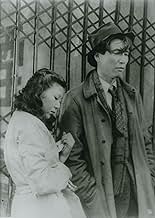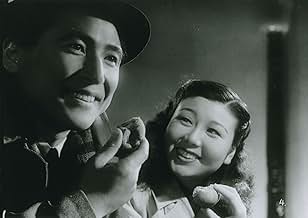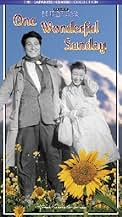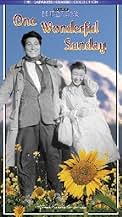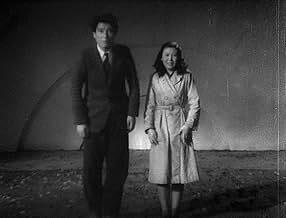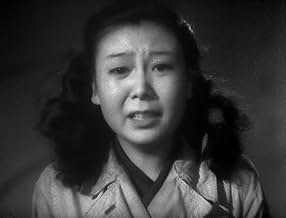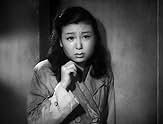IMDb RATING
7.2/10
4K
YOUR RATING
During a Sunday trip into war-ravaged Tokyo, despairing Yuzo and optimistic Masako look for work and lodging, as well as affordable entertainments to pass the time.During a Sunday trip into war-ravaged Tokyo, despairing Yuzo and optimistic Masako look for work and lodging, as well as affordable entertainments to pass the time.During a Sunday trip into war-ravaged Tokyo, despairing Yuzo and optimistic Masako look for work and lodging, as well as affordable entertainments to pass the time.
- Director
- Writers
- Stars
- Awards
- 2 wins total
Sachio Sakai
- Shady Ticket Man
- (uncredited)
- Director
- Writers
- All cast & crew
- Production, box office & more at IMDbPro
Featured reviews
I had said two weeks ago, in a review of Scandal, that Eclipse's new Kurosawa box set could just as easily be called Lesser Kurosawa. That's not fair. I know there are those who champion The Idiot and No Regrets for Our Youth, and even the one film I had previously seen from the set, I Live in Fear, is quite good (though it's hard to argue with it being a lesser film is such an outstanding oeuvre). The truth was, I was hoping very much to find some lesser-known Kurosawa classics. Which brings us to One Wonderful Sunday. Judging solely by IMDb's votes, it's Kurosawa's third least seen movie. And it ranks #26 out of 30 when listed by ratings. Well, I'll be happy to act like I was the first who discovered this hidden gem in Kurosawa's catalogue. This really is a wonderful little film. Influenced very much by Vittorio de Sica, one of Kurosawa's favorite directors, One Wonderful Sunday follows two young lovers, Yuzo and Masako (Isao Numasaki and Chieko Nakakita), spending the titular day together with nothing but ¥35 between them. The two experience sadness and hardship as they go about their date. The structure is episodic, as the lovers experience odd vignettes, meeting various post-war types, like bums and orphans and ticket scalpers. The two try to be happy with each other's company, but Yuzo's poverty makes him feel like less of a man. In one of the strongest sequences in Kurosawa's career, Yuzo decides to act like a cad to drive Masako away. Kurosawa was hardly ever the subtle type, and he is not known for long periods of silence or long takes. This sequence demonstrates a different side of the director. The climax of the film involves an odd breaking of the fourth wall resembling the device in J.M. Barrie's Peter Pan. As far as I know, this is the only time Kurosawa ever attempted such a thing. That wouldn't be too surprising, though, as film audiences rarely interact with characters on screen. It's just too out there for the medium. But God bless Kurosawa for trying it. It's kind of schmaltzy, but I loved the characters so much that at least I thought about clapping for them. A forgotten near-masterpiece.
This simple movie of a young, poor couple trying to enjoy their day off with little money is the best non-Italian neorealist film I've come across. True to the neorealist spirit, not a lot goes on; a gloomy Gus and his girlfriend wander the city, she trying to bring him out of his depression while it seems all of life is determined to keep him in it.
The movie does a good job of painting a picture of Japanese post-war poverty. Chieko Nakakita gives a wonderful, charming performance as she tries to cheer her beau and to fight against her own distress at their plight. Some scenes are truly striking, notably a trip through an uptown club and a tense, almost wordless scene between the two lovers.
The final big scene in the film drifts away from neorealism. It's an odd scene, and from a critical point of view I'm not sure what to make of it, but viscerally I found it rather affecting. I would love to know how audiences responded in Japan at the time.
There are a few issues in the movie. Some scenes go on too long (like the aforementioned "final big scene." And the guy's sudden emotional upswings often seemed to come out of nowhere, unlike his depressions, whose genesis was always clear. But overall it's a very human, simple movie with moments of joy and moments of pain, and I highly recommend it.
The movie does a good job of painting a picture of Japanese post-war poverty. Chieko Nakakita gives a wonderful, charming performance as she tries to cheer her beau and to fight against her own distress at their plight. Some scenes are truly striking, notably a trip through an uptown club and a tense, almost wordless scene between the two lovers.
The final big scene in the film drifts away from neorealism. It's an odd scene, and from a critical point of view I'm not sure what to make of it, but viscerally I found it rather affecting. I would love to know how audiences responded in Japan at the time.
There are a few issues in the movie. Some scenes go on too long (like the aforementioned "final big scene." And the guy's sudden emotional upswings often seemed to come out of nowhere, unlike his depressions, whose genesis was always clear. But overall it's a very human, simple movie with moments of joy and moments of pain, and I highly recommend it.
This film provides an interesting counterpoint to other Kurosawa films. Its portrayal of post-war Japan recalls Stray Dog, but the poverty and sleaziness in this case are used as the background for a romance between two very attractive young people, who have a Sunday date, but only 35 yen to spend. Yet there is not the gloom of Lower Depths. Both have jobs and we see his minimally decent rental room. The title seems throughout the film to be rather ironic, since most of the situations they encounter, such as being cheated at a snack bar, are far from wonderful. However, Kurosawa puts a positive spin at the conclusion. I agree with another reviewer that the device of having the girl speak to the audience, seeking our sympathy for young couples without money, who wish to marry, is a very awkward device that distracts from our interest in the relationship. However, I disagree with another reviewer who describes the ending as corny: we've all heard of Capra-corny. This film does not come up to Capra's level, but it is reminiscent of his human interest. It seemed to me that the closing device of the girl's making a date for the next Sunday works very well. Every film needs closure, and this one does not deal in high drama at any point, so a highly dramatic climax would not be appropriate. The viewer who wants that should go to Ran or Kagemusha. In my view, the early Kurosawa films showed him how to develop human relationships: a gift that later would be present in the samurai films, and would make them much more than action epics.
Far from being one of Kurosawa's best films, it is still a powerful and thoughtful one. He had already developed his filmmaking mastery at this point of time, and it can surely be seen by the way some of the scenes are made.
The film concerns a story of love surrounded by poverty and despair; the main characters of the film have the whole Sunday to go out and be together, the only problem being their shortness of money, as they only had 35 yens to go through the day. Being short of money as they were, there were not many things they could do, so they had to spend them wisely. This mainly leads to frustration from both sides, and so the film becomes depressing most of the time, even though they are really in love with each other and are happy to have a day available for them. Throughout the film they will encounter many obstacles and disheartening experiences, which will push them towards feeling impotent, but they always manage to bring happiness out of all that awful moments, and there is where the magic of this film resides.
It might seem like a simple, clichéd love story we have always been familiar with, and it actually could have just been that, if it was not for the Excellency of Kurosawa's filmmaking skills. He brings magic to many of the main scenes of the film, which definitely increases the experience by showcasing everything in detail. The last scene is really outstanding because of the way it is portrayed; you can actually feel both the pain and happiness they are feeling.
In conclusion, this film is definitely overshadowed by other masterpieces from Kurosawa's filmography, and is definitely not the best from him, but this little film is not to be skipped if you really like the director.
My score: 7.7/10
The film concerns a story of love surrounded by poverty and despair; the main characters of the film have the whole Sunday to go out and be together, the only problem being their shortness of money, as they only had 35 yens to go through the day. Being short of money as they were, there were not many things they could do, so they had to spend them wisely. This mainly leads to frustration from both sides, and so the film becomes depressing most of the time, even though they are really in love with each other and are happy to have a day available for them. Throughout the film they will encounter many obstacles and disheartening experiences, which will push them towards feeling impotent, but they always manage to bring happiness out of all that awful moments, and there is where the magic of this film resides.
It might seem like a simple, clichéd love story we have always been familiar with, and it actually could have just been that, if it was not for the Excellency of Kurosawa's filmmaking skills. He brings magic to many of the main scenes of the film, which definitely increases the experience by showcasing everything in detail. The last scene is really outstanding because of the way it is portrayed; you can actually feel both the pain and happiness they are feeling.
In conclusion, this film is definitely overshadowed by other masterpieces from Kurosawa's filmography, and is definitely not the best from him, but this little film is not to be skipped if you really like the director.
My score: 7.7/10
With this warm and uplifting film, the effect Kurosawa achieves is in the simplicity. The story is threadbare. Two lovebirds try to spend a Sunday together in post-war Tokyo and enjoy themselves with only 35 yen in their pockets. Kurosawa never ceases to amaze me because of his incredibly acute comprehension of the visual effects of a story. The simpler the story is, the more it becomes simply a day in their lives. The more it becomes a day in the life, the more upsetting we find the challenges facing them because of the Occupation and the crumbling economy at the time.
It's almost like a lightweight version of The Lost Weekend. There are no debilitating problems like alcoholism or writer's block. There are just obstructions and inconveniences with which the characters can either roll or stew around.
One Wonderful Sunday is a beautiful slice of life from a time that could be many different times in many different places. It's a peaceful movie about the peace that is always there for a given person, their journey being to find it. I have rarely seen a sequence so beautifully crafted on film as the two lovers in the empty, decaying concrete exterior auditorium, where one resolves to create the music they have been struggling to hear. There is hardly a handful of filmmakers living today that would think of such a thing. Kurosawa may have had the clearest, purest understanding of cinema out of any filmmaker.
It's almost like a lightweight version of The Lost Weekend. There are no debilitating problems like alcoholism or writer's block. There are just obstructions and inconveniences with which the characters can either roll or stew around.
One Wonderful Sunday is a beautiful slice of life from a time that could be many different times in many different places. It's a peaceful movie about the peace that is always there for a given person, their journey being to find it. I have rarely seen a sequence so beautifully crafted on film as the two lovers in the empty, decaying concrete exterior auditorium, where one resolves to create the music they have been struggling to hear. There is hardly a handful of filmmakers living today that would think of such a thing. Kurosawa may have had the clearest, purest understanding of cinema out of any filmmaker.
Did you know
- TriviaThe film's climax was considered a failure in both Japan and the U.S. as audiences refused to clap for the lead characters, though supposedly it went over very well in France, gaining much audience participation.
- GoofsA clock is seen above a shop in the baseball scene. The time showing is 5:05, but it is still only morning.
- SoundtracksLa Cumparsita
Composed by Gerardo Matos Rodríguez
- How long is One Wonderful Sunday?Powered by Alexa
Details
- Release date
- Country of origin
- Language
- Also known as
- One Wonderful Sunday
- Filming locations
- Toho Studios, Tokyo, Japan(Studio)
- Production company
- See more company credits at IMDbPro
- Runtime
- 1h 48m(108 min)
- Color
- Sound mix
- Aspect ratio
- 1.37 : 1
Contribute to this page
Suggest an edit or add missing content

